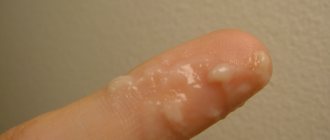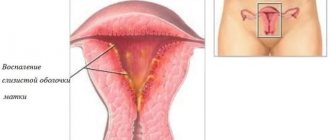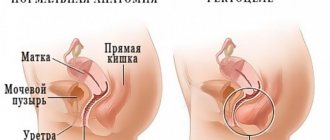Causes of unpleasant vaginal odor
The first thing that comes to mind if there is an unpleasant odor from the vagina is an inflammatory process. Sometimes this diagnosis is confirmed at a doctor’s appointment. Other variants of this unpleasant symptom are metabolic or hormonal imbalances, which can also be accompanied by a change in odor from the woman’s genital tract.
The list of diseases that are characterized by an unpleasant odor symptom is as follows:
- Dysbacteriosis. This disease refers to conditions in which the normal balance of “good” and “bad” microorganisms that populate the vaginal mucosa is disrupted. When immunity decreases, vaginal dryness or other problems occur, pathogenic microflora begins to develop rapidly, which causes an inflammatory process.
- Thrush. Thrush or candidiasis is a fungal infection. When taking a smear in the mucous membrane, laboratory tests reveal an increased amount of Candida type fungi, which are classified as opportunistic. That is, in order for thrush to begin, favorable conditions must be created. Most often, such conditions are created when immunity is reduced, for example, seasonally, due to hormonal changes or taking antibiotics.
- Gardnerellosis. It is bacterial vaginosis or vaginitis, caused by the bacterium Gardnerella vaginalis. This disease is easily diagnosed by its specific “fishy” smell. It should be noted that the vast majority of cases of gardnerella disease are sexually transmitted. However, this bacterium can be transmitted through household hygiene products. It is also worth noting that the unpleasant odor from the vagina after sex with this disease increases sharply.
- Colpitis. This disease is an inflammation of the vaginal walls, in which the coccal flora most often acts as the causative agent.
- Chronic sluggish processes in the female reproductive organs.
If an unpleasant odor from the vagina appears during pregnancy or after childbirth, then you should not immediately panic. In these conditions, the causes of unpleasant odors, in addition to the above diseases, may be:
- hormonal changes that increase or decrease the amount of natural secretions;
- postpartum discharge, which may also have a slightly unpleasant odor, but after 1-1.5 months such discharge should no longer bother the woman.
Expert opinion
If an unpleasant, putrid odor appears from the vagina after childbirth, you should immediately consult a doctor, as this may be a symptom of inflammation in the uterine cavity. Also, if symptoms of an unpleasant odor appear along with itching, burning or pain during pregnancy or after childbirth, you should consult a gynecologist as soon as possible.
Obstetrician-gynecologist of the highest category Oksana Anatolyevna Gartleb
unpleasant vaginal odor
Another common question is the causes of unpleasant vaginal odor after menstruation. There may be several options here:
- failure to comply with hygiene rules during this difficult period for women;
- proliferation of pathogenic microflora, for which menstrual flow is an excellent nutrient medium;
- hormonal disorders.
Diseases associated with unpleasant vaginal odor
A foul odor from the vagina often indicates pathological processes occurring in the body.
- Thrush. Caused by fungi of the genus Candida. The disease occurs against the background of a sour odor, white cheesy discharge, burning and itching. Spots and rashes of various types (vesicles, pimples) appear on the labia.
- Bacterial vaginosis. Decreased immunity or changes in vaginal acidity provoke the development of pathogenic bacteria. Dysbacteriosis is accompanied by copious white-gray discharge that smells like fish. There is no burning or itching. There may be discomfort during sexual intercourse. The unpleasant odor from the vagina intensifies after sex.
- Colpitis (vaginitis). Inflammation of the vaginal mucosa caused by one or more types of pathogens. Symptoms: copious mucous, purulent, bloody or brown discharge; itching and burning; swelling and redness of mucous membranes; pain in the lower abdomen and genitals; painful urination.
- Gonorrhea. A sexually transmitted disease that affects the mucous membranes of the genitourinary system. It is accompanied by purulent discharge, burning and itching, painful urination, intermenstrual bleeding, redness and swelling of the vulva, pain in the lower abdomen, ulcers on the lips.
- Chlamydia. It is transmitted sexually and is often asymptomatic. Manifests itself in the form of white or yellow mucopurulent discharge, itching and burning, frequent and painful urination, nagging pain in the lower back and lower abdomen.
- Trichomoniasis. Infectious STD with characteristic features: profuse leucorrhoea from the vagina; yellow or green foamy discharge; hyperemia of the vagina and labia; discomfort during urination and sexual intercourse.
- Inflammation of the uterus and appendages. Characterized by slight white discharge that smells like onions.
- Cervical erosion. Ulcers and erosive areas are damaged by mechanical action (sexual intercourse, insertion of tampons), causing bleeding and the appearance of an iron odor.
- Diabetes. The secretion smells like acetone due to the excretion of ketone bodies with biological fluids.
If alarming symptoms appear, you should visit a gynecologist. The doctor will order the necessary tests, make a diagnosis and, if necessary, prescribe appropriate treatment. To prevent the problem from returning, it is important to follow preventive measures:
- maintaining intimate hygiene;
- careful use of cosmetics and hygiene products;
- adequate fluid intake and proper nutrition;
- strengthening the immune system;
- using condoms during casual sexual intercourse;
- visiting a gynecologist once every six months;
- timely treatment of diseases.
A strong vaginal odor is a good reason to visit the hospital. An unpleasant phenomenon is often a sign of serious diseases that lead to serious consequences. Even if there is no pathology, it is always better to be safe.
What to do if you have an unpleasant vaginal odor?
Self-treatment if an unpleasant odor appears from the vagina is not a solution. In this case, the problem may become even more serious. Therefore, it is necessary to clearly establish the cause of the unpleasant odor, for which the gynecologist takes a smear for laboratory testing. If any infections are detected, the doctor must prescribe treatment, which often involves the use of local medications that do not affect the entire body. This is especially important during pregnancy, as well as in the postpartum period.
If the cause of unpleasant odor from the genital tract is associated with vaginal dysbiosis, the Gynocomfort Restoring Gel can be used as an additional remedy used in the complex treatment of dysbiosis. Developed by specialists from the pharmaceutical company VERTEX, this product underwent clinical trials at the Department of Dermatovenereology with the clinic of St. Petersburg State Medical University and showed its high effectiveness in normalizing vaginal biocenosis.
Vitamins in complex therapy in the treatment of unpleasant vaginal odor
In addition to the treatment prescribed by the doctor, a woman should consider strengthening the body’s immune defense. This is especially necessary if the doctor has identified thrush or another infection that occurs with decreased immunity or hormonal imbalance. In this case, courses of vitamins, a revision of the diet in favor of vegetables and fruits, and an increase in the amount of clean water that a woman drinks daily will be useful. Also during the treatment period, it is especially important to avoid intimacy, carefully observe hygiene rules and completely abandon bad habits. Smoking and alcohol not only seriously reduce immunity, but also provoke hormonal imbalances.
For daily intimate hygiene, the use of special products is recommended.
For example, the use of Gynocomfort washing gels helps maintain the natural microflora of the vagina at the required level. These products were developed by specialists from the pharmaceutical company VERTEX and have all the necessary documents authorizing their use for intimate hygiene. Sources:
- BACTERIAL VAGINOSIS IN PREGNANT: PROBLEMS AND SOLUTIONS. Voronin K.V., Chuiko V.I., Ben Saada Nakhla // Medical perspectives. – 2011. – No. 4. – pp. 97-106.
- MODERN VIEWS ABOUT THE MECHANISMS OF DEVELOPMENT OF VAGINAL DYSBIOSIS. Dobrokhotova Yu.E., Zatikyan N.G. // Obstetrics, gynecology and reproduction. – 2008. – No. 1. – P. 7-9.
- The state of vaginal microbiocenosis and methods for correcting its disorders during pregnancy. P.V. Budanov, A.N. Strizhakov // Issues of gynecology, obstetrics and perinatology. – 2007. – T.6, No. 5. – pp. 89-95.
- Etiopathogenesis, diagnosis and modern directions in the treatment of bacterial vaginosis. V.N. Prilepskaya, G.R. Bayramova // Russian. honey. magazine. – 2002. – T. 10, No. 18. – P. 705-797.
- Possibilities for correcting dysbiotic conditions of vaginal and cervical canal biotopes in pregnant women at risk. AND ABOUT. Kryzhanovskaya, E.Yu. Lebedenko, A.S. Martyshenko, V.V. Chernavsky // Rus. honey. magazine. – 2003. – No. 1. – pp. 27-30.
- https://www.medicalnewstoday.com/articles/317560.php
- https://www.healthline.com/health/womens-health/how-to-get-rid-of-vaginal-odor
- https://www.verywellhealth.com/why-does-my-vagina-smell-funny-3133225
Causes of unpleasant odor from an intimate place i
Before moving on to the consequences, it is necessary to carefully study the causes. Note that we didn't come up with this. But, since this logic works like a charm, we will follow it. And here is a list of the most common causes of unpleasant vaginal odor:
- Poor vaginal hygiene, infrequent washing;
- Excessive vaginal hygiene, too frequent washing with bactericidal solutions;
- Vaginal dysbiosis;
- The use of antibacterial lubricants during sexual intercourse;
- Reaction to partner's secretions;
- Gynecological pathologies;
- Drug therapy;
- Hormonal changes;
- Use of certain chemical contraceptives;
- Weakened immunity;
- Too frequent change of sexual partners;
- Pregnancy;
- Stress, overwork;
- Intake of certain foods (onions, garlic, etc.);
- Stagnation of sperm in the vaginal folds;
- Increased secretion of vaginal lubrication during sexual arousal.
As you can see, there are plenty of reasons leading to the appearance of an unpleasant odor from the vagina. In fact, there are many more of them. Only the main ones are given here. But we will assume that we have studied the category “what is bad luck.” Now let’s move on to the “how to deal with it” category. But before that, let's briefly look at how the smell from the vagina can be influenced directly by the sexual act itself and your beloved man, who takes an active part in it.
Popular questions
Hello, I have been experiencing discharge with an unpleasant fishy odor, especially during sexual intercourse.
I tried pimafucin suppositories, there were no results, please tell me what to do? Hello! To clarify the diagnosis, I recommend conducting an examination - analysis of femoflora screening 12, which will clarify the cause of bacterial vaginosis. Before receiving the test result, you can begin treatment by using Elzhina complex suppositories for 6 days in combination with Gynocomfort gel with tea tree oil. The obtained result will allow you to adjust the treatment.
Will the smell disappear if I use GINOCOMFORT?
To eliminate odor in the genital tract, Gynocomfort gel with tea tree oil is suitable. In addition to anti-inflammatory components, it also contains lactic acid, which will increase the number of lactobacilli and will optimize the pH environment in the genital tract.
Good evening. I have discharge with an unpleasant odor, which gets worse after intercourse. Could this be Gardnerellosis? And how to treat?
Hello! First of all, you should see an obstetrician-gynecologist and undergo an examination to determine the exact cause and identify pathogenic microflora. This will help you correctly draw up a treatment and recovery plan. While waiting for results, you can start using Gynocomfort gel with tea tree oil, which will have an anti-inflammatory effect and speed up the healing process. The gel is applied once a day for 14 days.
Hello, Oksana! I developed a very strong vaginal odor. There’s simply no time to go to the hospital. Please suggest an effective treatment, suppositories, tablets, etc. Thank you in advance.
Hello!
A change in the smell of discharge from the genital tract can accompany a number of diseases from bacterial vaginosis to specific inflammation. Therefore, it is not possible to recommend a universal remedy without conducting an examination aimed at identifying the pathogen and conducting an examination to clarify the prevalence of the process. The use of Gynocomfort gel with tea tree oil will help improve your well-being and prevent the spread of inflammation until the results of examinations are received, as well as speed up the healing process. The product is used 1 dose 1 time per day for 7-14 days as needed. For an accurate diagnosis, contact a specialist
Vaginal odor during pregnancy and after childbirth
The appearance of an unpleasant vaginal odor is not always caused by the development of serious pathologies of the reproductive system.
Sometimes this symptom appears in women during pregnancy. A change in the severity of the odor, if it is not accompanied by signs of irritation and hyperemia of the skin and mucous membranes, is most often associated with hormonal changes in the body. When, along with a change in the smell, consistency and volume of vaginal discharge, a pregnant woman experiences pain, a burning sensation and itching in the genital area, it is necessary to immediately seek medical help. Such symptoms indicate dangerous inflammatory or infectious pathologies that develop against the background of a decrease in the body’s defenses and threaten the health of the expectant mother and fetus. After the birth of a child, a woman develops a characteristic discharge with a fishy odor, but this is not dangerous and often does not cause discomfort. Over the course of a month, this discharge changes in consistency and color from thick and brown to transparent, after which it disappears completely. But if a woman has a rotten smell from her vagina during the postpartum period, we may be talking about infection. This condition requires emergency medical attention.
If an unpleasant odor appears from the vagina, a woman should seek advice from a gynecologist in order to prevent serious complications for the organs of the reproductive system. Douching at home, “masking” with scented daily hygiene products, uncontrolled and haphazard use of medications can only aggravate a delicate problem. Effective complex therapy, including the use of antibacterial and hormonal drugs, lactic acid and drugs that restore the balance of microflora, can only be prescribed by a doctor based on direct examination, laboratory analysis of secretions and ultrasound examination of the pelvic organs.











